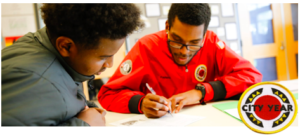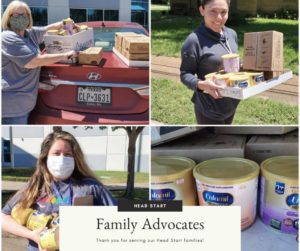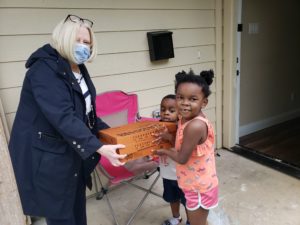Michael Wood, Manager, Education & Workforce
Since mid-March, the COVID-19 pandemic has challenged communities nationwide, elevating needs related to food insecurity, affordable housing, virtual learning, and social-emotional and mental health. In response, community-based nonprofit organizations have responded with crucial and urgent support to those in need amid the crisis.
Four Dallas Region nonprofits – Momentous Institute, City Year, Head Start of Greater Dallas, Inc., and Vogel Alcove – are among those that have stepped up to aid struggling families, students, and educators in the wake of COVID-19.
Mental health has become an elevated concern for many during the pandemic, given the crisis’ dramatic impact on daily life. Dallas-based Momentous Institute is a national leader in promoting social-emotional health and well-being for children and families. Alongside its flagship school, Momentous offers training for educators, and therapeutic mental health services for children and their families.
Amidst the pandemic, Momentous continued all of this important work from a distance; making the Momentous School and its Therapeutic Services department virtual. Separately, Momentous leveraged COVID-19 relief funding to aid families in areas outside the nonprofit’s mission, such as rent assistance and support paying grocery, utility, and internet bills.
The shift to virtual programming bolstered Momentous’ training efforts. Through a series of webinars, Momentous offered best practices on remote social-emotional learning, teacher mental health, and tips for talking to young children about the pandemic, among other topics. The virtual nature of these events enabled greater participation from parents and educators across the country, and Momentous was able to scale its parent education services, in particular, after a significant uptick in demand.
“The biggest need in this space was during the spring,” noted Heather Bryant, Director of Innovation and Impact for the Momentous Institute. “Teachers and school administrators were stressed about supporting students in difficult situations virtually. We geared our training opportunities to address that need.”
The Dallas chapter of City Year, an AmeriCorps program dedicated to supporting students and schools, is one beneficiary of the Momentous Institute’s expanded virtual trainings. Traditionally, City Year corps members support students holistically through a combination of academic intervention, after school programs, and mentorship. This school year, in light of COVID-19’s impact on the classroom, City Year’s cohort is keenly focused on assisting teachers.

To that end, the City Year cohort underwent a revised five-week training program designed to prepare corps members as instructional assistants for their assigned partner teachers. The updated training regimen included Momentous’ social-emotional learning strategies, deep-dives into effectively leveraging virtual learning platforms, and practice dissecting a teaching standard. Corps members even took a practice STAAR test based on the grade and subject taught by their respective partner teacher to better understand what is expected of students by year-end.
With the school year underway, the City Year cohort is working alongside teachers in the classroom, offering a much-needed helping hand as educators work to balance the academic progress of two groups of students – one set in the classroom, and another in their homes.
“Ultimately, the goal is to ensure that all students, whether they are in-person or virtual, are progressing equally,” said Heather Holland, Executive Director of City Year Dallas. “Our corps members can help facilitate that by providing an extra layer of support to the teachers.”
Teachers, however, are not the only ones in need of support with remote instruction. For parents of very young children, virtual learning has been a particularly tall task. Since mid-March, Head Start of Greater Dallas, Inc., which serves children ages six weeks to five years, has endeavored to provide comprehensive support for the parents and families of its students to ensure continuity of learning and a safe home environment.

A primary focus for Head Start was coaching parents and guardians up on best practices for effective virtual learning for young children. Through Head Start, parents were provided research-backed trainings, everyday activities to stimulate a child’s learning, and an online bank of educational resources and lessons to assist in their child’s development.
“At Head Start, our philosophy is that parents are a child’s first teacher,” said Kathryn McCartney, CEO of Head Start of Greater Dallas. “We have been working hard with our parents to reinforce this idea and help them support their child’s development.”
Learning was only one part of the equation for Head Start as the nonprofit implemented measures to support families and children holistically. At the pandemic’s outset, Head Start conducted biweekly virtual visits with students and their families, citing research that children are more susceptible to abuse and neglect if families experiencing significant stress – such as job loss – do not have regular contact with schools or social service providers. Recently, Head Start also began providing meals up to three times per week to ensure children and their families have adequate food at home.
Providing these wraparound services to children and families struggling amid the COVID-19 pandemic was, and remains, a priority for many education organizations focused on young children. Vogel Alcove, an early education provider that serves children experiencing homelessness, is committed to broadly supporting its students and families through the crisis.

Considered an essential service, Vogel Alcove remained open at the height of mandated closures for children whose parents worked in an essential industry. Still, Vogel Alcove recognized that both those children and the ones unable to visit the center had pressing needs outside of the classroom. At the start of widespread closures, Vogel Alcove staff mobilized thousands of deliveries to children and their families, including food for the week and other basic goods that were difficult to come by, such as clothing, toilet paper, cleaning supplies, face masks, and diapers, among other necessities. In total, Vogel Alcove delivered nearly 16,000 meals in just six weeks.
“We don’t have the kind of business where we can stop serving families,” said Karen Hughes, CEO of Vogel Alcove. “We rolled up our sleeves, and got it done. It didn’t matter what your title was, it was our mission to make sure our families were okay.”
The nonprofit was quick to reinstate in-person programming for all families once local stay-at-home orders were lifted, and even hosted its traditional on-site summer camp. Today, Vogel Alcove is largely back to providing its usual services – albeit with enhanced safety requirements – and continues to address emerging needs. For example, Vogel Alcove has opened its doors to kindergarten through fifth-grade students who need additional help with virtual learning.
A commonality that has enabled all of these nonprofits to succeed – and, in turn, support students, families, and teachers – is the generosity of the Dallas Region community. That generosity was on full display during North Texas Giving Day, an annual giving event dedicated to supporting regional nonprofit organizations. This year, the event garnered a record-breaking $58.8 million in donations.
To learn more about each of these organizations, please visit: